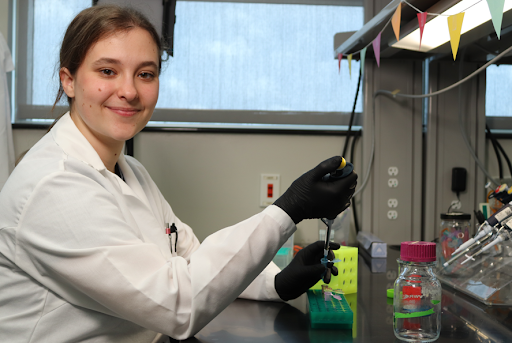
Kathryn Anderson, a Cell and Molecular Neuroscience major in the Dulin Laboratory, is investigating one of the lesser-known but life-altering effects of spinal cord injury (SCI): male infertility. While it is well established that most men with SCI experience reduced fertility due to low sperm quality, the biological mechanisms underlying this remain largely unexplored. Kathryn’s project seeks to uncover those mechanisms, with the potential to advance both scientific understanding and future therapeutic approaches.
Since joining the Dulin Lab in August 2024, Kathryn has trained under Principal Investigator Dr. Jennifer Dulin and graduate mentor Akram Esfandani. Her work has given her hands-on experience in a wide range of techniques, including immunohistochemistry, neural circuit tracing, tissue clearing, flow cytometry, and rodent handling. She continued her research through the summer of 2025 with support from a $2,500 College of Arts & Sciences stipend, further honing her skills and contributing to the lab’s discoveries.

For Kathryn, research has been both intellectually and personally transformative:
“Research has been a foundational part of my undergraduate science education by allowing me to explore neuroscience in greater depth and by giving me insight into the nature of knowledge itself. With the perspective gained from research, I can see science for what it really is: an ever-changing, ever-growing pool of what is known and—more excitingly—what is unknown. The insights I’ve gained will continue to shape me well into my future, where I hope to innovate in medicine through research.”
Equally important, Kathryn has found a sense of belonging in her research environment:
“The Dulin Lab has provided me with an endlessly uplifting environment in which to grow. I am constantly inspired and supported by my lab family, which has pushed me to be a better undergraduate researcher, student, and person.”
Through her research, Kathryn is not only developing the skills and perspectives that will shape her future career, but also helping shed light on a critical yet underexplored complication of spinal cord injury.
